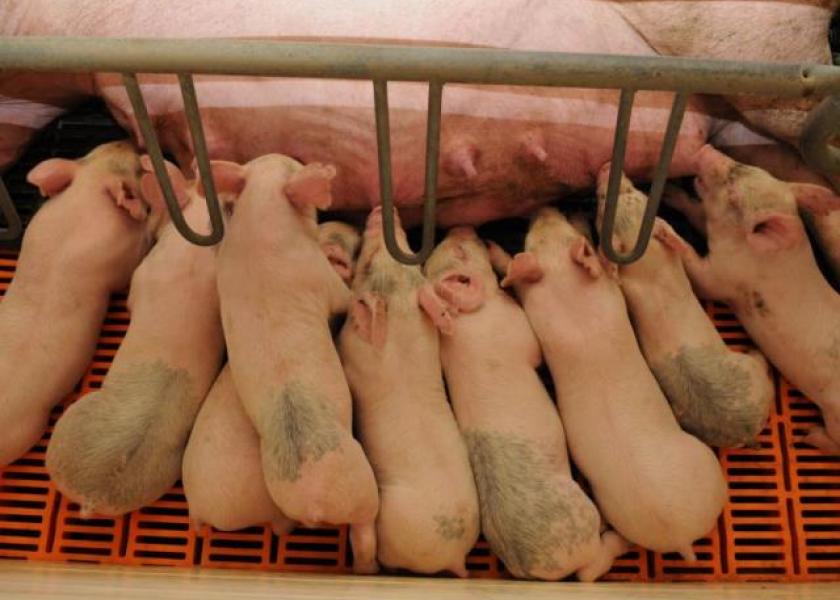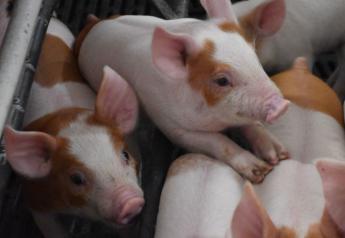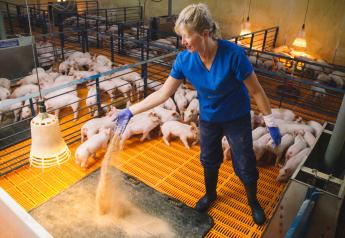When Piglets Pay the Price of Mom’s Heat Stress

Piglets born to heat-stressed sows may carry the burden of their mom’s discomfort later in life in the form of health complications and diminished performance, reports USDA’s Agricultural Research Service (ARS).
In utero heat stress may also hypersensitize the piglet’s immune system and do more harm than good to the young animals, a team of ARS and university scientists has learned.
Pigs are at a greater risk of health and production problems because of their inability to sweat. This can result in millions of dollars of lost revenue for swine producers.
Over the years, research has shown pigs experiencing heat stress during pregnancy can predispose their offspring to complications later in life that can lead to diminished performance, including efficient feed use, growth rate and ultimately, pork production, ARS reports in a release.
But little is known about how this stress affects their offspring’s innate immunity against disease-causing bacteria and other pathogens, said Jay S. Johnson, an animal scientist at the ARS Livestock Behavior Research Unit in West Lafayette, Ind., in the release.
Johnson, in collaboration with fellow ARS scientists and researchers from Purdue University, Oak Ridge Institute for Science and Education and the University of Missouri, evaluated two groups of 16 piglets each. The first group was born to mothers exposed to stressful temperature cycles ranging from 79 to 97 degrees Fahrenheit during the first half of pregnancy. The second group was born to moms exposed to a “comfortable” 64 degrees Fahrenheit.
The researchers simulated a pathogen attack on the piglets using lipopolysaccharide, a molecule found in the cell walls of some bacteria, the release said. Blood samples were drawn to monitor certain markers of the piglets’ innate immune response, including glucose, insulin, non-esterified fatty acids, cortisol (a stress hormone) and cytokines (markers of inflammation). These, along with white blood cell counts, were compared to a lipopolysaccharide-free group of piglets used as controls.
The researchers found that the core body temperatures of the in utero heat-stressed and non-stressed piglets given the lipopolysaccharide were about the same. However, in utero heat-stressed piglets had higher levels of the stress hormone cortisol, the release said.
“These same piglets also had greater cytokine (markers of inflammation) levels in response to the lipopolysaccharide challenge, which provided evidence of a hypersensitive immune response. The researchers worry this could translate to greater risk of pain, infection, organ failure and other complications in such piglets under real-world production systems,” USDA said.
Increasing concern over the potential impacts of global climate change on swine welfare and management—especially in regions of the world prone to frequent or prolonged drought and heat waves – dovetails with this research, the report noted.
With support from USDA’s National Institute of Food and Agriculture, researchers are also taking a genomic approach to preventing the effects of in utero heat stress on piglets, including using genomic markers to flag traits for improved heat tolerance in sows used for breeding.
“To achieve this goal, we are partnering with two major swine breeding companies,” Johnson said in the release. “Our hope is that completion of this project will provide swine producers with a cost-effective strategy to reduce the negative impact of in utero heat stress on swine in the United States and globally.”
This research was published in the Journal of Animal Science.
More from Farm Journal's PORK:







